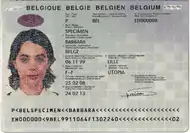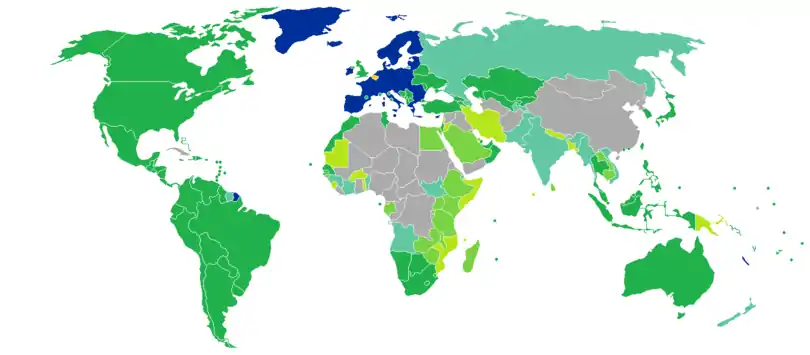Belgian passport
Belgian passports are passports issued by the Belgian state to its citizens to facilitate international travel. The Federal Public Service Foreign Affairs, formerly known as the Ministry of Foreign Affairs, is responsible for issuing and renewing Belgian passports. Every Belgian citizen is also a citizen of the European Union. The nationality allows for free rights of movement and residence in any of the states of the European Union as well as other European Economic Area states and Switzerland upon possession of a passport, or a national identity card.
| Belgian passport | |
|---|---|
 The front cover of a contemporary Belgian biometric passport (2008) | |
 The information page of a contemporary Belgian biometric passport | |
| Type | Passport |
| Issued by | |
| First issued | 1 February 2008 (biometric passport) 1 May 2014 (current version)[1] |
| Purpose | Identification |
| Eligibility | Belgian citizenship |
| Expiration |
|
| Cost |
|
Types of passports
- Standard Passport – Issued for ordinary travel, such as vacations and business trips. The passport identifier is an 8-character alphanumeric with the structure AB123456; 2 alphas followed by 6 digits. Available in 35 and 60-page formats. New (2015) Biometric Passports have a 7-year Validity with an approx. cost of 93.50 Euros depending on the Commune/Consulate and fingerprints are scanned.
- Diplomatic Passport – Issued to members of the Belgian Royal Family, members of the government, ministers of State and representatives of Belgium or of the Communities or Regions (diplomats, economic or trade attaches, the main representative of each Community or Region)
- Service Passport – Issued to civil servants within the federal public services, ministries, parliaments and judicial services sent on an official mission abroad by the Belgian authorities.
- Temporary Passport is a passport issued in Emergency Conditions by the provinces valid for 6 months, if there is a justifiable urgent matter requiring immediate travel. This Passport is recognisable by its dark green cover.
- Emergency Travel Document is issued by Belgian diplomatic representatives abroad when a previously issued passport has been lost . It is burgundy and has only 6 pages.
Physical appearance
Belgian passports are burgundy, with the Belgian smaller Coat of arms emblazoned in the centre of the front cover. The words "EUROPESE UNIE" (Dutch), "UNION EUROPÉENNE" (French), "EUROPÄISCHE UNION" (German) – "KONINKRIJK BELGIË" (Dutch), "ROYAUME DE BELGIQUE" (French), "KÖNIGREICH BELGIEN" (German) are inscribed above the coat of arms and the word "PASPOORT – PASSEPORT – REISEPASS" is inscribed below the coat of arms. Belgian passports have the standard biometric symbol (![]() ) at the bottom and use the standard EU design.
) at the bottom and use the standard EU design.
The sequence of the languages on the cover is Dutch-French-German, French-Dutch-German, or German-French-Dutch, depending on the affiliation with the lingual community of its holder.
Visa requirements

According to the 2019 Visa Restrictions Index, Belgian citizens can visit 184 countries without a visa or with a visa granted on arrival (tied with Canadian, Greek, and Irish passports). Belgian citizens can live and work in any country within the EU as a result of the right of free movement and residence granted in Article 21 of the EU Treaty.[3]
Passport forgery
According to the Belgian police, 19,050 blank Belgian passports had been stolen between 1990 and 2002 and had been used to create forged travel documents.[4]
Gallery of historic images
 Belgian passport, circa 1940
Belgian passport, circa 1940 Biometric passport (2004 version)
Biometric passport (2004 version)
References
- "Council of the European Union - PRADO - BEL-AO-08001".
- "Treaty on the Function of the European Union (consolidated version)" (PDF). Eur-lex.europa.eu. Retrieved 17 April 2015.
- "How to fake a passport". The New York Times. 10 February 2002. Retrieved 17 April 2015.